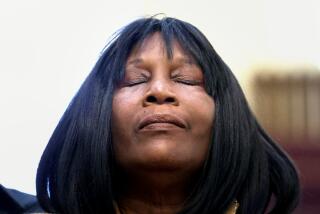After 14 Years, Walsh Still on His Personal Crusade
- Share via
The scumbags and lowlifes, as John Walsh refers to them in his rapid-fire staccato monotone, must have dreamed of a moment such as this: Walsh, the force behind “America’s Most Wanted,” the Fox television show turned cultural phenomenon that has helped capture hundreds of fugitives, said he lay near death a few weeks ago in a Florida hospital, a priest at his side administering the last rites.
At that time, in mid-November, Walsh recounted in a recent interview in Los Angeles, he was believed to have a case of gastrointestinal anthrax, thought to be the result of a trip to the Brentwood postal facility in Washington, D.C. Walsh had gone there at the invitation of Postmaster General John Potter, who was announcing a $1-million reward for the capture of the people responsible for the anthrax attacks and had asked the “America’s Most Wanted” operators to take telephone tips on the case. Walsh’s visit took place before anyone realized the extent of the contamination that ultimately led to the death of two of the site’s workers.
As Walsh lay in a Florida hospital’s intensive care unit, his blood pressure falling precipitously, he said, his thoughts were of the absurdity of the situation. “You know, guys have tried to kill me. I’ve been in motorcycle crashes. I’ve been washed away at sea twice. People have shot at me, but I’m going to die from going to the post office,” he recalled thinking.
It may have surprised Walsh’s doctors, but few others, that Walsh, whose dramatic personal history and flair for derring-do give him a larger-than-life quality, survived that bleak November night. In fact, he didn’t have anthrax but cholera, contracted while in the Middle East chasing terrorists, again by invitation. All par for the course for a businessman who was turned into a crusader by personal tragedy and who has helped change the laws of the land regarding missing children; a savvy broadcaster with no media background who founded one of television’s longest-running shows, barely avoided cancellation and now looks to branch into a daytime talk show; a heartbroken father who first clashed with the FBI and then went on to win the agency’s highest civilian award, as well as kudos from all levels of law enforcement.
Walsh today is the nation’s “go-to guy,” the man whom authorities called after the bomb went off in Oklahoma City, the man the White House called after the jets hit the World Trade Center towers and the Pentagon. When the kidnapping of baby Jasmine Anderson from a Chicago bus station became national news last week, Walsh was the expert CNN put on the air to talk about child-abduction cases. (Police later found the infant unharmed in West Virginia.) Three days after the first “America’s Most Wanted” show aired in 1988, its first featured fugitive was caught, and the format has varied little since: File footage, background data and dramatic reenactment highlight a case, and viewers are asked to call the show’s operators (not the authorities) with tips. “Most Wanted” claims to have helped catch 689 criminals, 15 of them from the FBI’s most wanted list.
“We’re the court of last resort,” Walsh said. “We catch the uncatchable. If you’re ever really desperate to solve a case,” he says with pride and confidence, “you’ll be calling me.” In the wake of the hunt for Osama bin Laden, who has been featured on “America’s Most Wanted” for years (as have other terrorists), the show seems to have a renewed purpose. Larry King had Walsh on his show last Thursday to talk about terrorists, with Walsh casually mentioning that his program “is very big in Saudi Arabia.”
It may even, in some sense, have been a precursor of reality TV. “There’s no more reality and illusion anymore. People don’t know what’s real and what’s a metaphor,” said Richard Walter, a professor and screenwriting chairman in the department of film, television and digital media at UCLA. “It’s the real thing. It’s reality, and it isn’t. It’s a television presentation. People are fascinated by this.
“It’s absolutely a voyeuristic experience,” he added, calling it “wonderfully involving” because the show calls on people to participate in crime-solving. The show, now in its 14th season, averages 9.4 million viewers on Saturday night (9 p.m., KTTV), according to Nielsen figures, down from its peak in its second year, when some 15 million viewers watched, but enough to make it one of Fox’s highest-rated programs. Only three other prime-time network series (“60 Minutes,” “20/20” and “Monday Night Football”) have aired longer.
“‘America’s Most Wanted’ is not just a job to me. It’s a passion,” Walsh said. “It’s the way that I honor my son’s memory. I learned from the coroner who did Adam’s autopsy. He said, ‘You have free will. ... Why don’t you make sure your son didn’t die in vain?’ This is not bragging: Myself and the American public and the people who work on ‘America’s Most Wanted’ are better than any cop in the history of this country. We’ve caught more people. For me, that’s a legacy for Adam.”
Adam is Walsh’s 6-year-old son, who was abducted from a Sears store in Florida some 20 years ago and later beheaded. The trauma turned Walsh, the partner in a hotel management company, into Walsh, the crusader for victim’s rights. And his audience’s emotional ties to the show helped Walsh survive another kind of near-death experience when, in 1996, a reconfigured Fox briefly canceled his show. “America’s Most Wanted” was off the air for all of six weeks before an army of protesters, including dozens of governors and members of Congress, scores of law enforcement personnel and some 200,000 loyal, letter-writing fans, led the network to reconsider.
Walsh’s unlikely television career also may be expanding. This year he filmed the pilot for a daytime talk show on NBC that he only half jokingly says could make him “the next Phil Donahue.” Walsh, who turned 56 last Wednesday, said he has talked about such a show for a number of years but agreed to pursue it only if he could choose the topics. The pilot, for example, was about the issue of child bullies, he said, though he added that he wanted the show to include a wide range of topics while not sinking into the titillation gutter that bedevils daytime talk shows. According to NBC, the show is scheduled to begin next fall in syndication.
Talk Show Won’t Stop
Pursuit of Suspects
Walsh said he has no intention of giving up “America’s Most Wanted” on Fox for the sake of a daytime talk show on NBC. And if anyone can overcome the inherent obstacles of such a situation, he is probably the one. After all, Walsh, and his wife, Reve, who had three more children, now ages 7 to 19, after Adam’s death, became tireless reformers. In October 1982, 15 months after Adam’s death, Congress passed the Missing Children Act, which set up an FBI database of missing children and empowers parents to report a case if local police refuse.
In 1984, the couple founded the National Center for Missing and Exploited Children, a nonprofit center that is a resource for parents, schools and law enforcement in missing children’s cases. The center has worked on more than 73,000 cases of missing and exploited children and has helped to recover more than 48,000 children. It maintains a toll-free hotline ([800] THE-LOST) to report a missing child or the sighting of one.
The Adam Walsh case became the catalyst for a movement. Abducted children’s faces began appearing on milk cartons, on pieces of direct mail and on shopping bags. Eventually, tens of thousands of stores across the nation adopted a system, dubbed “Code Adam,” that was created by Wal-Mart to give its employees standard procedures for handling lost children and securing store exits to help reduce the chance of an abductor getting away with a youngster.
The family’s heartache was dramatized in two television movies and painfully chronicled in Walsh’s best-selling 1997 memoir, “Tears of Rage,” the first of three books he has written. To this day, Walsh alternately refers to himself as a “manhunter” and “the father of a murdered child” in the flat monotone that is his signature. Walsh, whose pleas to the FBI during his own son’s case were ignored at the time, went on to win the agency’s highest civilian award. He has testified before Congress more than 55 times and is an advocate for a constitutional amendment for victims’ rights.
Ironically, the show couldn’t solve his son’s murder. The prime suspect in the Adam Walsh case, a drifter named Ottis Toole, was never charged. He died in prison while serving a life sentence for other crimes and “took the truth to the grave with him,” Walsh said.
*
Karen Brandon is a national correspondent for the Chicago Tribune, a Tribune company.
More to Read
The complete guide to home viewing
Get Screen Gab for everything about the TV shows and streaming movies everyone’s talking about.
You may occasionally receive promotional content from the Los Angeles Times.






